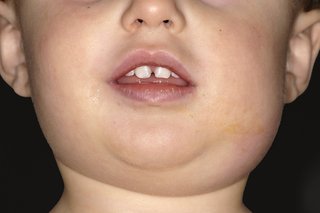If You Had Mumps Can You Get It Again
Mumps is a contagious viral infection that used to be common in children before the introduction of the MMR vaccine.
Symptoms of mumps
Mumps is almost recognisable by the painful swellings in the side of the confront under the ears (the parotid glands), giving a person with mumps a distinctive "hamster face" appearance.

Other symptoms of mumps include headaches, articulation hurting, and a high temperature, which may develop a few days before the swelling of the parotid glands.
Important: Coronavirus (COVID-19)
At the moment it can be hard to know what to do if your kid is unwell.
It'southward important to trust your instincts and get medical assistance if yous demand it.
When to run into a GP
It's of import to contact a GP if you suspect mumps so a diagnosis can be made.
While mumps is not usually serious, the condition has similar symptoms to more serious types of infection, such every bit glandular fever and tonsillitis.
Your GP can usually make a diagnosis subsequently seeing and feeling the swelling, looking at the position of the tonsils in the mouth and checking the person's temperature to encounter if information technology's higher than normal.
Allow your GP know in advance if you're coming to the surgery so they can take any necessary precautions to prevent the spread of infection.
If your GP suspects mumps, they should notify your local health protection team (HPT). The HPT will arrange for a sample of saliva to be tested to ostend or rule out the diagnosis.
Find your local health protection team on GOV.UK
How mumps is spread
Mumps is spread in the same way as colds and flu: through infected droplets of saliva that can be inhaled or picked up from surfaces and transferred into the mouth or nose.
A person is nigh contagious a few days earlier the symptoms develop and for a few days later.
During this time, it's important to prevent the infection spreading to others, particularly teenagers and young adults who have not been vaccinated.
If you have mumps, you tin can help preclude information technology spreading by:
- regularly washing your hands with soap
- using and disposing of tissues when you lot sneeze
- fugitive school or piece of work for at least 5 days after your symptoms first develop
Preventing mumps
You tin can protect your kid confronting mumps by making sure they're given the combined MMR vaccine for mumps, measles and rubella.
The MMR vaccine is part of the routine NHS childhood immunisation schedule.
Your child should exist given 1 dose when they're around 12 to 13 months and a second booster dose at iii years and 4 months.
One time both doses are given, the vaccine provides around 88% protection against mumps.
Anyone who did not accept both doses of the MMR vaccine as a child tin contact a GP to arrange to exist vaccinated.
Treatment for mumps
There's currently no cure for mumps, but the infection should pass inside 1 or 2 weeks.
Handling is used to relieve symptoms and includes:
- getting enough of bed rest and fluids
- using painkillers, such as ibuprofen and paracetamol – aspirin should not be given to children under 16
- applying a warm or cool shrink to the swollen glands to assist save pain
Complications
Mumps usually passes without causing serious damage to a person'southward health. Serious complications are rare.
But mumps tin lead to viral meningitis if the virus moves into the outer layer of the brain.
Other complications include swelling of the testicles or ovaries (if the affected person has gone through puberty).
Find out more nearly the complications of mumps
Who's afflicted
Most cases of mumps occur in younger adults who did not receive the MMR vaccine as part of their childhood vaccination schedule and did not accept mumps equally a child.
Older adults who were born in the UK before the vaccine was introduced are likely to have had mumps as a kid. Once you have been infected by the mumps virus, you ordinarily develop a life-long amnesty to further infection.
The MMR vaccine was introduced in 1988. Adults born between 1980 and 1990 may not accept been vaccinated equally children, and are less likely than older adults to have had mumps as a child.
Mumps is currently most common among people built-in in the belatedly 1990s and early on 2000s who missed out on the MMR vaccine as children.
Folio last reviewed: 24 September 2021
Adjacent review due: 24 September 2024
Source: https://www.nhs.uk/conditions/mumps/
Postar um comentário for "If You Had Mumps Can You Get It Again"